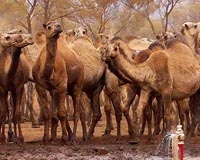| . |  |
. |
Blacksburg, Va. (UPI) Nov 26, 2009 U.S. scientists have secured funding to complete the genetic map of the North American domesticated turkey adorning millions of U.S. dinner tables Thursday. The Turkey Genome Sequencing Consortium -- made up of Virginia Polytechnic Institute and State University researchers working with the University of Minnesota, the University of Maryland and the U.S. Department of Agriculture -- received a $908,000 USDA grant to complete the last 10 percent of the turkey genome decoding, the researchers said. A benefit of the decoding will be that turkeys could lead healthier lives if breeders know how their immune systems work and how to fight off such pathogens as bird flu, the consortium scientists say. Another goal is to identify genes that might produce larger breasts or plumper legs, the researchers told The Washington Post. "You can start addressing flavor traits, texture traits," said Otto Folkerts, associate director of technology development at Virginia Tech's Virginia Bioinformatics Institute. "Sometimes people might want a turkey to taste more like a wild turkey," he said. The pieces of the genome's last tenth are the hardest to find, scientists said, with researchers scouring the entire genome time and again. "Every time, you will find pieces that were not there before," Rami Dalloul, an assistant professor of poultry immunology, told the Post. It will take a year to complete the map, then another to find genetic variances from one breed of turkey to another, the scientists said. It might be several more Thanksgivings before genomic science reaches the dinner table, the Post said. Turkeys are the fourth-leading source of meat in the United States, after cows, chickens and pigs. Those three animals have already been genetically cataloged. Share This Article With Planet Earth
Related Links Darwin Today At TerraDaily.com
 Australia prepares to cull 'biblical' camel plague
Australia prepares to cull 'biblical' camel plagueSydney (AFP) Nov 26, 2009 Australian authorities were preparing Thursday to round up with helicopters a 6,000-strong herd of wild camels terrorising a remote Outback community and shoot them dead in the desert. Protracted drought had brought the camels into the Docker River township in search of water, leaving residents cowering in their homes as they smashed through water mains and invaded the airstrip, officials ... read more |
|
| The content herein, unless otherwise known to be public domain, are Copyright 1995-2009 - SpaceDaily. AFP and UPI Wire Stories are copyright Agence France-Presse and United Press International. ESA Portal Reports are copyright European Space Agency. All NASA sourced material is public domain. Additional copyrights may apply in whole or part to other bona fide parties. Advertising does not imply endorsement,agreement or approval of any opinions, statements or information provided by SpaceDaily on any Web page published or hosted by SpaceDaily. Privacy Statement |